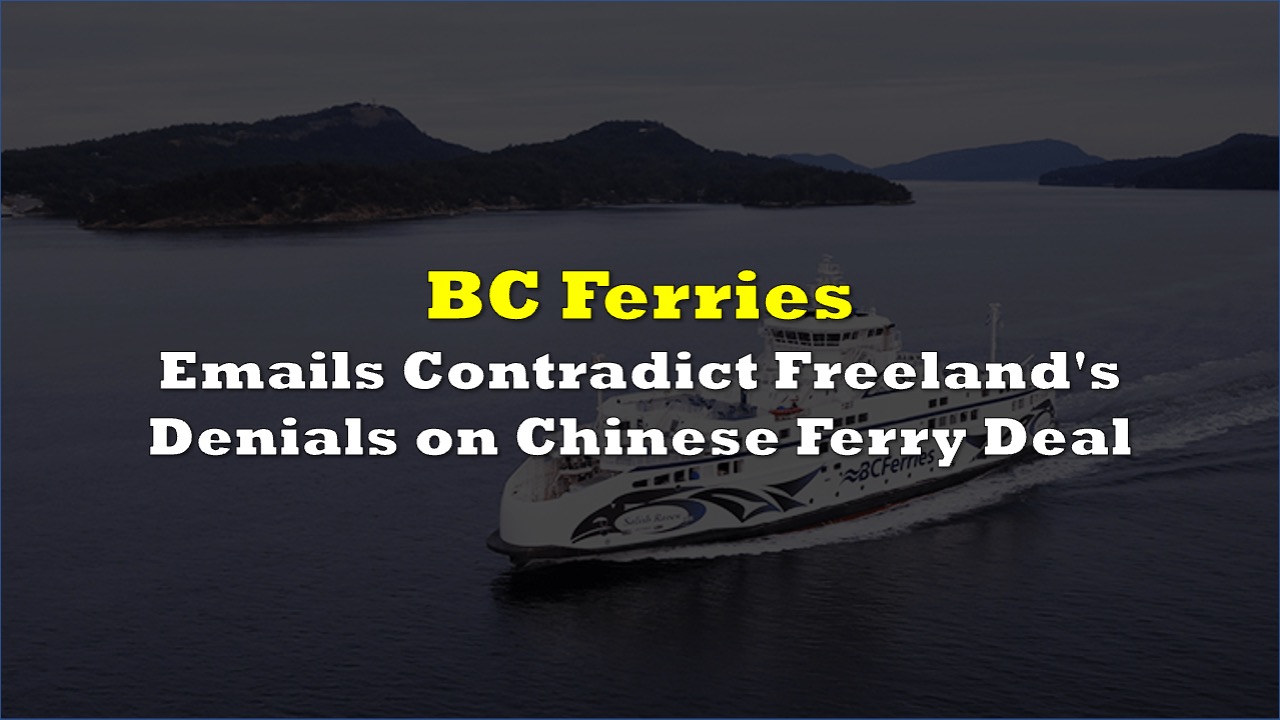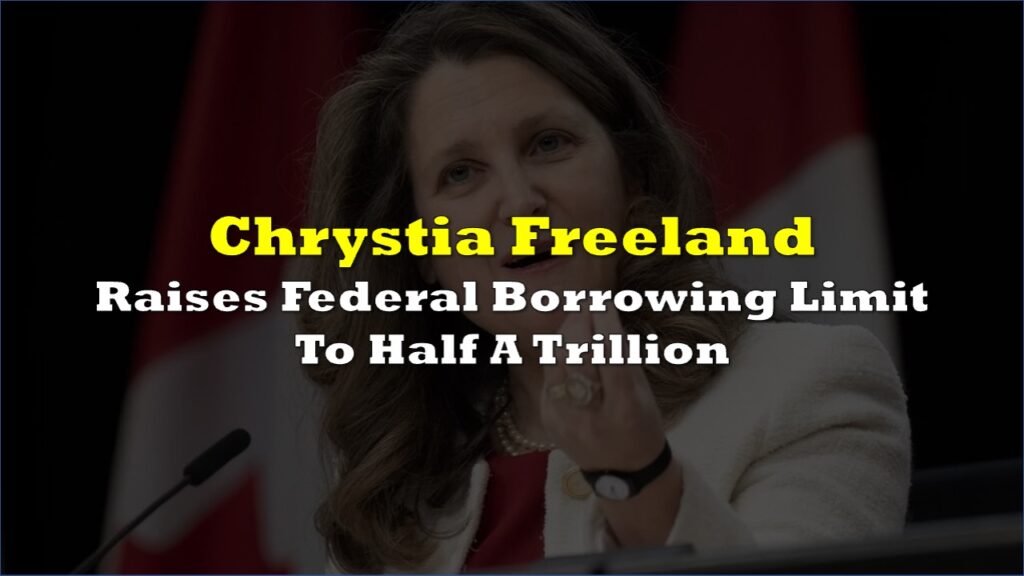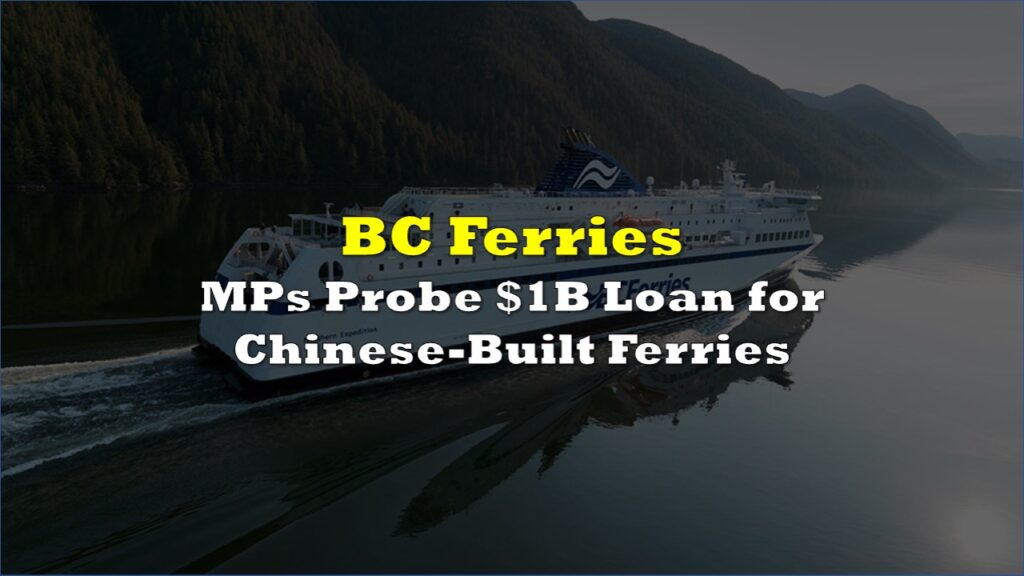Internal government emails contradict Transport Minister Chrystia Freeland’s public statements about federal involvement in BC Ferries’ controversial Chinese shipyard deal, revealing Liberal staff coordinated messaging around a $1-billion federal loan while Freeland publicly distanced Ottawa from the purchase, according to documents The Globe and Mail obtained.
During parliamentary Question Period in June, Freeland told lawmakers she shared the “concern and anger” of other MPs about BC Ferries’ plan and dismissed suggestions Ottawa was connected to the deal. When Conservatives pressed her about federal involvement, she said the issue had nothing “to do with Ottawa,” telling the House of Commons “no such confusion” existed “on this side of the House.”
But internal emails reveal that while Freeland made these public statements, senior Liberal political aides privately strategized about managing the Canada Infrastructure Bank’s financing commitment for the same purchase. The bank had already committed the $1 billion before Freeland’s June parliamentary comments, though the federal government had not formally announced the loan to the public.
BREAKING NEWS: Another Liberal Scandal
— Dr. Leslyn Lewis (@LeslynLewis) September 15, 2025
Chrystia Freeland stood in Parliament dismissing any federal role in BC Ferries’ $1-billion deal with a Chinese state-owned shipyard.
But leaked e-mails show the truth:
1. The Canada Infrastructure Bank (a federal Crown corporation)… pic.twitter.com/8igV456WL7
Staff sent the emails around the time of Freeland’s parliamentary statements, showing coordination between multiple government offices on managing the federal loan announcement. Communications director Mohammad Hussain wrote to Prime Minister’s Office staff about moving forward with announcing the loan “as a paper release” to avoid drawing attention, adding that “the BC government not stepping in also gives us cover.”
Former PMO spokesperson Jeremy Collard suggested in an email that the government could proceed with the announcement while managing political fallout. He noted that opposing the purchase would mean “delays and significantly higher costs,” and warned that “the project is likely not viable without our loan.”
The emails also show staff discussing potential political risks, with one aide noting concerns about “the signal it sends to China” and referencing an “unidentified assistant deputy minister” who had raised questions about the deal’s optics amid broader Canada-China tensions.
The House of Commons transport committee launched a study in August of the infrastructure bank’s loan decision, with members voting for a motion calling on the bank, BC Ferries and the federal government to provide documents, including the complete bond purchase agreement and records of all options for acquiring new vessels.
Conservative transport critic Dan Albas, who moved the motion, said the documents could help the committee sort out “a number of contradictory statements” on the file.
PM Carney telling the truth isn’t embarrassing. Conservatives pretending Ottawa runs BC Ferries is. They know better — but hope Canadians don’t.
— Will Greaves (@WillWJGreaves) September 15, 2025
BC Ferries runs its own business. The PM’s job isn’t to indulge Conservative conspiracies. Leadership requires facts, not fiction. pic.twitter.com/J9vy7rqSm1
During the August committee hearing, Freeland told MPs she was “dismayed” by BC Ferries’ decision to purchase the vessels from the Chinese shipbuilder, though she did not call for the loan’s cancellation. She said she has sent 71 letters directing all organizations under Transport Canada to prioritize Canadian content in major procurements, particularly Canadian steel, aluminum, and lumber.
When Canadian options aren’t available, she said, the preferred option is buying from countries with trade deals that include reciprocal procurement agreements. Freeland did not directly respond when MPs asked whether the government would push for cancellation of the loan, saying she agrees this is a moment of crisis for the steel and aluminum sector, and they need government support.
Infrastructure Minister Gregor Robertson told the committee the shipbuilder was chosen by BC Ferries, not the federal government or the infrastructure bank. He said BC Ferries conducted its own procurement process that didn’t yield bids from Canadian shipyards.
BC Ferries announced in June that it had hired China Merchants Industry Weihai Shipyards to build four new vessels after this procurement process. The infrastructure bank’s low-cost loan includes up to $690 million to buy the vessels and up to $310 million for electrification infrastructure. The bank said the new ferries “wouldn’t likely be purchased” without this financing.
Information for this story was found via the sources and companies mentioned. The author has no securities or affiliations related to the organizations discussed. Not a recommendation to buy or sell. Always do additional research and consult a professional before purchasing a security. The author holds no licenses.









